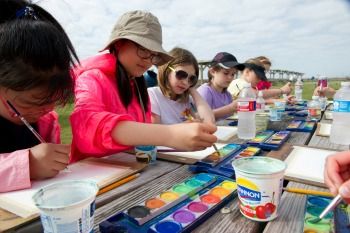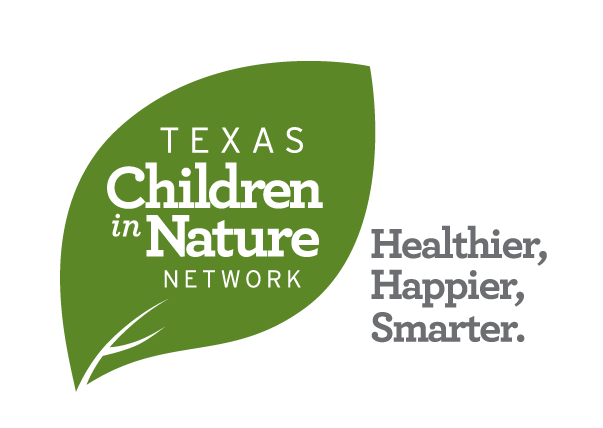
Are More Creative
Have you ever asked children to tell you what they see, think, smell or feel in a natural setting? Are you amazed at how creative their answers can be? Nature has long been the source of inspiration for ideas, works of art, inventions, literature and music. When kids come up with their own games they are fostering their imaginations.
Creativity is a strong component of critical thinking and important in a child’s development. More importantly, when kids are allowed to explore and use their imagination, it’s really fun for them and the accompanying adults.
Nature-based Risky Play Can Promote Young Children’s Development
This study investigated the effects of an intervention designed to increase opportunities for young children to engage in nature-based risky play. Risky play, which offers children the thrill of uncertainty, is positively associated with physical activity, social health, and exploration and understanding of the world. A decrease in opportunities for risky play is of concern.
The study examined the effects of an intervention to increase opportunities for nature and risky play in the outdoor play environments of two childcare centres using a repeated measures mixed methods design. Assessments of children and their outdoor playspace were conducted before and after changes were made to each center’s outdoor environment. The study used the Seven Cs play space design criteria, adding natural materials to enhance affordances for play. It measured changes in play, social behaviour, psychological wellbeing, and physical activity in 45 children aged 2 to 5.
Findings indicated significant decreases in depressed affect, antisocial behaviour and moderate to vigorous physical activity, and increases in play with natural materials, independent play, and prosocial behaviours. Early Childhood Educators observed improved socialization, problem-solving, focus, self-regulation, creativity and self-confidence, and reduced stress, boredom and injury. Outdoor play spaces are important for promoting children's wellbeing and development.
- Brussoni, Mariana, Takuro Ishikawa, Sara Brunelle, and Susan Herrington. 2017. “Landscapes for Play: Effects of an Intervention to Promote Nature-Based Risky Play in Early Childhood Centres.” Journal of Environmental Psychology 54 (December): 139–50. https://doi.org/10.1016/j.jenvp.2017.11.001.
Nature Kindergarten Helps Children Discover Their Own Ideas
Initiated by a team of educators and academics, the only full-day nature kindergarten program in British Columbia started operations in September 2012 at a local elementary school. Following the model of forest schools in Scandinavian countries, the nature kindergarten provides young children with large amounts of time in natural outdoor settings where they can play, explore and experience natural systems and materials. In this paper, the creation of the nature kindergarten and the pedagogical principles on which it is based is described. The paper also illustrate children's experiences outdoors. Finally, it reports preliminary findings of research evaluating the effects of being in nature on children's nature relatedness and their environmentally responsible behavior.
Beginning in September 2012, the nature kindergarten had a class of 21 students that spent two and a half hours out in nearby natural areas each school day, regardless of the weather. A game-like assessment adapted from previous research with elementary school children was used to measure children’s nature relatedness and their environmental behaviors. The responses of the nature kindergarten students were compared to a control group of 22 children attending two elementary schools in the same community. Both sets of children were assessed at the beginning and end of the school year.
Analysis of the assessment suggests that children in the nature kindergarten were more closely related to nature than children in the regular kindergarten, with the nature-relatedness scores of the children in the nature kindergarten increasing slightly over the year while the scores of the control group declined slightly over the year. No significant differences in environmentally responsible behaviors were identified between the two groups of children. The researchers suggested that possible explanations for this result, which they deemed to be surprising, were ceiling effects in the measurement approach and the potentially longer timespan needed to show changes in behavior. The observations gathered by the researchers during the pilot year of the program provide rich insight into what is possible in this type of setting. These observations suggest that nature kindergartens foster a community of learners; promote children’s social skills, as seen in the way the children offered to support one another’s efforts; help children discover their own ideas, strengths and confidence; and nurture a deep connection to the environment, as demonstrated by the caring and concern shown by the children. The researchers emphasize that this study is supportive of the idea that “education within nature is particularly important in early childhood because direct experience with various environments facilitates the development of positive feelings and attitudes towards nature and natural phenomena.”
- Elliot, Enid, Kayla Ten Eycke, Sharon Chan, and Ulrich Müller. 2014. “Taking Kindergartners Outdoors: Documenting Their Explorations and Assessing the Impact on Their Ecological Awareness.” Children, Youth and Environments 24 (2): 102–22. https://doi.org/10.7721/chilyoutenvi.24.2.0102.
City Parks Offer a Sense of Place
This brief article draws on solid research, some of which is independently referenced elsewhere in this list. Among the points made are that city parks offer a sense of place, opportunity for daily experience with nature, experiences that enhance school achievement, and antidotes to alienation. This American Planning Association City Parks Forum Briefing Paper is largely inspired by the work of Robin Moore, noted and pioneering landscape designer with a commitment to creating learning landscapes that optimize children’s learning. "Natural spaces and materials stimulate children’s limitless imaginations and serve as the medium of inventiveness and creativity," says Moore. Readers will find tangible reasons for the benefits associated with using city parks as places for learning as well as community-based examples and resources.
- "How Cities Use Parks to . . . Help Children Learn," Chicago, IL: American Planning Association, 2003 is available on line at www.naturalearning.org and www.planning.org.
- Health Benefits to Children
